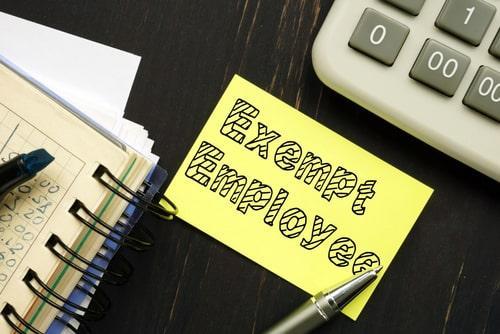
 847-995-1205
847-995-1205
When Can Illinois Employers Classify Employees as Exempt?
 Every employer needs to understand the laws and regulations surrounding employee classification. The Fair Labor Standards Act (FLSA) outlines the rules for classifying employees as exempt or non-exempt. In Illinois, employers need to be aware of certain rules when it comes to classifying employees. Understanding the nuances between the different classifications can help protect a business from liability down the line.
Every employer needs to understand the laws and regulations surrounding employee classification. The Fair Labor Standards Act (FLSA) outlines the rules for classifying employees as exempt or non-exempt. In Illinois, employers need to be aware of certain rules when it comes to classifying employees. Understanding the nuances between the different classifications can help protect a business from liability down the line.
Understanding the Difference Between Exempt and Non-Exempt Employees
The federal Fair Labor Standards Act establishes criteria for employers to use when determining whether an employee should be classified as exempt or non-exempt. The FLSA also sets minimum wage and overtime pay requirements for non-exempt employees. Exempt employees are not subject to these requirements, meaning that their wages are not based on hours worked, but rather on salary level and job duties.
Illinois Rules Regarding Exemption from Overtime Pay
In order to qualify for exemption from overtime pay under Illinois law, an employee must be paid a salary that is above the minimum threshold set by the Department of Labor. In 2022, this threshold is $684 per week. It is important to note that simply paying an employee a salary does not guarantee they will be considered exempt—they must also meet other criteria related to their job duties in order to qualify for exempt status. The following types of employees may be classified as exempt:
-
Executives - These workers' primary duties must be related to the management of a company or enterprise, and they must regularly direct the work of at least two employees.
-
Administrative workers - These employees must primarily perform non-manual work that is directly related to a company's management policies or general business operations.
-
Professionals - These may include "learned professionals" who perform advanced work in a scientific field or another profession that requires specialized education or "creative professionals" who work in artistic fields.
-
Computer workers - These include workers such as computer programmers, systems analysts, software engineers, or others who have specialized knowledge of computer systems and software. Certain types of computer workers may also be classified as exempt if they earn at least $27.63 per hour.
-
Outside salespeople - Workers who primarily make sales outside of their employer's place of business may be exempt, as long as they do not spend more than 20 percent of their hours worked on non-sales activities. These workers do not need to meet minimum salary requirements to be classified as exempt.
Common Mistakes Employers Make When Classifying Employees as Exempt
One common mistake employers make is assuming that because an employee is paid a salary rather than hourly wages, they must automatically be classified as exempt from overtime pay requirements. There are other factors that must be taken into consideration, such as job duties and salary level, before determining whether an employee qualifies for exempt status or not. Another mistake employers make is misclassifying non-exempt employees as exempt in order to avoid paying them overtime wages. This is illegal, and it can result in costly penalties due to non-compliance with overtime wage regulations.
Contact Our Illinois FLSA Attorney
Classifying employees correctly is essential for any employer operating in Illinois, and failure to do so can result in costly penalties from both state and federal agencies. It is important to understand the difference between exempt and non-exempt employees, while also considering federal and state laws regarding job duties and salary levels. By knowing these guidelines ahead of time, employers can reduce their risk of liability down the line. Employers should consult with legal counsel prior to making any changes that could affect how their employees are classified in order to ensure that they remain compliant with all applicable labor laws. At The Miller Law Firm, P.C., we can provide guidance in these matters and ensure that employers meet all applicable requirements. To learn more about how we can assist with these issues, contact our Schaumburg employment lawyer at 847-995-1205 and schedule a free consultation.
Sources:
https://www2.illinois.gov/idol/Laws-Rules/FLS/Pages/overtime-exemption.aspx
https://www2.illinois.gov/idol/FAQs/Pages/minimum-wage-overtime-faq.aspx
Contact Us


Schaumburg, IL 60173
Phone: 847-995-1205
